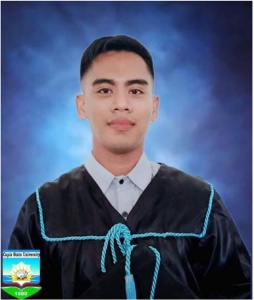
Having an abundant life while living with his whole family was Raffy Borreros’ dream as he grew up in the province of Capiz.
Raffy came from a poor household with six members. At an early age, he experienced struggles and challenges while helping his family.
After his parents got separated, Raffy and his three siblings were raised by his father who worked as a construction worker and a farmer.
“At bilang nakatatandang anak, ako ang nagsilbing ina sa aking mga nakababatang kapatid na noon ay uhaw sa pag-aaruga ng isang ina (As the oldest child, I took the responsibility of being a mother to my younger siblings who were deprived of maternal care),” Raffy narrated.
Even though life was never easy for Raffy, his determination to achieve his dreams did not falter.
“Sa kabila ng lahat na kahirapan, hindi namin pinabayaan ang pag-aaral. Bawat araw ay lumalakad kami ng dalawang kilometro papunta sa paaralan at pauwi sa bahay kahit walang baon. Minsan, nagdadala kami ng mga produkto galing sa aming mga pananiman sa bukid at ito ay ipinagbibili sa aming mga kaklase or kaya sa mga guro namin para may iuwing pagkain o baon sa susunod na mga araw (Despite all the difficulties, we never gave up on learning. We have to walk two kilometers to school and back to our home every day, without a single money. We sometimes bring products from our crops and sell them to our classmates or to our teachers so we can bring home food or we have allowance for the next few days),” Raffy shared.
However, Raffy had to stop studying for one whole year when he was in high school. It was also the time when their family became a beneficiary of the Pantawid Pamilyang Pilipino Program (4Ps).
The 4Ps is a flagship program of the national government on poverty reduction and social development. It provides cash grants to extremely poor households to improve their health, nutrition, and education, particularly for children aged 0-18. It invests in human capital to break the intergenerational cycle of poverty among poor households.
“Nasa high school ako noon at napahinto sa pag-aaral ng isang taon dahil sa samo’t saring mga kadahilanan. Ngunit, ng dumating ang 4Ps, muli akong bumalik sa pag-aaral dahil may sapat na tulong mula sa programa. Naging katuwang na namin ang 4Ps sa mahabang panahon sa pagbibigay ng pinansiyal na pangangilangan sa loob ng tahanan at paaralan hanggang ako ay nakatapos sa high school (I was in high school at the time and I had to stop studying for a year due to various reasons. But when we became a 4Ps beneficiary, I went back to studying because the program was providing enough assistance. The 4Ps has been assisting our family in providing financial assistance for our daily expenses and even educational expenses until I finished high school),” Raffy explained.
“Bilang grantee, malaki rin ang tulong ng Family Development Session (FDS) para hubugin ang pag-iisip ng aking ama sa tamang pagdala ng relasyon sa bawat miyembro ng pamilya, karapatan ng bata, at iba pa (As a grantee, the Family Development Session (FDS) also helped a lot to shape my father’s thinking on the right relationship with each family member, the rights of the child, among others),“Raffy pointed out.
After finishing secondary education, Raffy was in despair if he could still continue his studies in college. He knew their conditions and he was also aware that pursuing tertiary education is more expensive.
After he got accepted at the Capiz State University’s Dayao Satellite College, Raffy felt elated. He was able to take a Bachelor of Elementary Education course for free because of the free tuition of the government in public universities and through the scholarship under the Commission on Higher Education’s (CHED) Tertiary Education Subsidy (TES).
The TES is a grant-in-aid program under Republic Act 10931 or the Universal Access to Quality Tertiary Education Act given to qualified students enrolled in CHED-recognized public and provincial higher education institutions.
It prioritizes the beneficiaries of the Pantawid Pamilyang Pilipino Program (4Ps) and other households included in the Listahanan by supporting at least the partial cost of tertiary education, inclusive of education-related expenses.
However, life’s struggles didn’t stop there. Raffy endured more hardships while studying.
“Sa aking pag-aaral sa kolehiyo hindi naging madali sa akin ito dahil naranasan kong maglakad nang malayo upang makatipid ng pamasahe, gutom, matinding pagod, puyat at stress dahil sa mga negatibong salita na aking maririnig” (It was not easy for me while studying in college. I had to walk a great distance to save money, endure hunger, felt extreme tiredness, stayed up late, and experienced stress because of the negative words I would hear),” Raffy recalled.
“Nagdaan pa ang ilang taon, namatay ang aking ama dala na rin sa kalungkutan dulot ng paghihiwalay nila ni ina (A few years later, my father passed away due to sadness caused by his separation from my mother),” an emotional Raffy said.
Unexpectedly, Raffy’s mother came back home after several years.
With the joy of having their mother again and the memories of his late father, Raffy continued to pursue his dreams in life until he graduated from college cum laude (with honors).
Raffy is now a licensed teacher after passing the Licensure Examination for Teachers (LET) in March this year. #


